Suchergebnisse für "Factsheet: Energietechnologien gestalten, die für alle sinnvoll und nutzbar sind"
LenA circular houses - Demonstration of the circular architecture design process for circular andreuse building based on the lighthouse project LenA
The main objective is to research and demonstrate the positive climate impact of reuse in the construction industry. Through this (re)use of components, products and material groups, large shares of the emissions generated by the construction industry can be avoided and contribute to the targeted climate neutrality. Another aspect is to design the connections of the components in such a way that they can be deconstructed and reused.
LehmKur - Rammed earth walls for multi-storey residential buildings
Research of a lighthouse project consisting of rammed earth-timber exterior wall components with accompanying ecological life cycle analysis, building physics simulations and documentation of the necessary logistical, building law, fire and soundproofing measures.
LehB:KlimafitDemo2+1 - Living in existing buildings today: climate-friendly renovations in existing buildings within the framework of the common good housing law
The LehB:KlimafitDemo2+1 project examines innovative renovation solutions for the climate-fit modernization of non-profit residential buildings without placing a financial burden on tenants. By implementing a flexible modular system and involving the residents, economic, technical and social aspects of the renovation are optimized. The aim is to make an important contribution to achieving climate neutrality by 2040 through adapted measures and comprehensive monitoring.
KlimaQuartierNikolai
The project aims to improve sustainable energy supply and energy efficiency for the planned NikolaiQuartier in Villach by utilizing waste heat and local energy sources. An innovative energy concept, which also includes the regional hospital, is being developed. Active involvement of residents and stakeholders is key to securing acceptance of the eco-friendly neighbourhood.
Urbaner Kältebedarf in Österreich 2030/2050
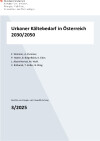
Systematische Aufarbeitung des steigenden Kühlbedarfs und Darstellung der geographischen Verortung des Kältebedarfs in Österreich. Das Ergebnis dient als Entscheidungshilfe bei der Entwicklung von Klimaschutzmaßnahmen und Klimawandelanpassungsstrategien sowie eine Abschätzung zum Kältebedarf der Zukunft.
Schriftenreihe
3/2025
F. Wimmer, A. Pummer, P. Holzer, B. Beigelböck, K. Eder, L. Abart-Heriszt, M. Wolf, C. Rzihacek, T. Keller, B. Kling
Herausgeber: BMK
Deutsch, 91 Seiten
Downloads zur Publikation
Post City Linz – Biodiversität im CO2 neutralen Quartier (Green.diversity.Linz)
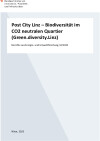
Mit dem Sondierungsvorhaben "Post City Linz" soll gezeigt werden, dass eine derzeit wenig attraktive Industriebrache durch einen innovativen Nutzungsmix aus Büro, Gewerbe, Hotel und Wohnen zu einem mikroklimatisch ambitionierten, energie- und ressourceneffizienten Quartier umgewandelt werden kann. Der Schwerpunkt liegt in der Integration einer Biodiversitätsförderung, einer CO2-neutralen Energieversorgung und innovativem Energiemanagement im Quartier, animal aided design sowie dem Regenwassermanagement am Prinzip der „Schwammstadt”.
Schriftenreihe
32/2025
M. Majcen, T. Weiss, I. Haymerle, S. Kotrba, S. Formanek, A. Boden, L. Boß, S. Nussmüller, M. Stefan, D. Wernig, A. Putrih, A. Frey, P. Doppler, H. Engelke
Herausgeber: BMIMI
Deutsch, 159 Seiten
Downloads zur Publikation
Ausschreibung zum ÖGUT-Umweltpreis geöffnet!
Das BMK unterstützt vier Kategorien: "Mit Forschung & Innovation zur Kreislaufwirtschaft", "Klimaneutrale Stadt", "Frauen in der Umwelttechnik" und "Partizipation und zivilgesellschaftliches Engagement". Einreichschluss: 13. September 2024
Designing Synergies. Spatial and Energetic Transformation Scenarios for Small Towns and Municipalities Using the Example of the Wagram Region (Lower Austria).
An interdisciplinary exploratory project that synergistically analyses strategies for the activation of vacant buildings and the potential for the formation of small-scale energy communities. The starting point is student projects from the Institute of Architecture and Design, TU Wien, for four municipalities in the Wagram region. On this basis, an interdisciplinary team of experts is developing a concept for a synergy cluster focussing on spatial energy planning, building physics, the circular economy and social innovation.
10., Rothneusiedl - climate model district Rothneusiedl: Preparation for the planned EU mission "New European Bauhaus"
Rothneusiedl will become a pioneering district for climate protection, climate adaptation and the circular economy. The existing RothNEUsiedl Charter outlines nine principles for making the district climate-friendly and inclusive. The dialogical and integrated process involves various target groups, including the planning and construction industry, future residents and businesses, in order to establish a local building culture at an early stage. NEB working principles are applied in order to support the parallel mission statement process.
TOPS – Topology-optimised reinforced concrete slabs with digital formwork and reinforcement
The TOPS project is investigating material-efficient ribbed concrete slabs, which save up to 50% of the concrete used in conventional flat slabs by topology-optimisation. A 'file-to-factory' process enables the automated production of formwork and reinforcement using digital technologies. The construction method reduces CO₂ emissions and contributes to the decarbonisation of the construction industry.
Machbarkeitsanalyse zertifizierte Plus-Energie-Quartier-Sanierung des denkmalgeschützten Otto-Wagner-Areals (OttoWagner-ArealPlus)
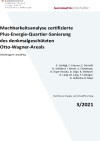
Entwicklung eines innovativen denkmalschutzverträglichen Sanierungskonzepts zur Transformation des Wiener Otto Wagner-Areals in ein Plus-Energie-Quartier. Das Jugendstil-Juwel umfasst eine Fläche von rund 50 Hektar, 70 Gebäude und eine Brutto-Grundfläche von rund 200.000 m². Der Lösungsansatz umfasst dabei höchste Energieeffizienz- und Komfortanforderungen.
Schriftenreihe
3/2021
K. Schlögl, C. Kresser, E. Schriefl, H. Schöberl, I. Artner, S. Chatterjee, D. Ürge-Vorsatz, D. Ürge, K. Stieldorf, F. Gharakhanzadeh, I. Stieldorf, G. Lang, M. Lang, T. Lebinger, G. Jedliczka, B. Mayr
Herausgeber: BMK
Deutsch, 162 Seiten
Downloads zur Publikation
Umsetzung regionaler Elektromobilitätsversorgung durch hybride Kopplung (Move2Grid)
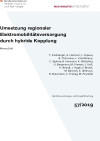
Aufbauend auf den Ergebnissen der „Stadt der Zukunft“ Sondierungsprojekte „Smart Exergy Leoben“, und „Energieschwamm Bruck“ soll im gegenständlichen,umsetzungsorientierten Forschungsvorhaben anhand des Beispiels Leoben untersucht werden, wie mit regionalen, erneuerbaren Ressourcen regionale Elektromobilität langfristig versorgt, optimal ins kommunale Verteilernetzsystem integriert und ökonomisch nachhaltig implementiert werden kann.
Schriftenreihe
57/2019
T. Kienberger, A. Hammer, J. Vopava, B. Thormann, L. Kriechbaum, C. Sejkora, R. Hermann, K. Watschka, U. Bergmann, M. Frewein, J. Koß, H. Brandl, J. Vogel, S. Moser, M. Baresch, K. de Bruyn, R. Braunstein, C. Freitag, M. Peyreder
Herausgeber: BMVIT
Deutsch, 172 Seiten
Downloads zur Publikation
ReAssuRe – risk management for re-use of construction components and building technology by non-destructive on-site testing procedures
Risk assessment and insurability is essential for the re-use of functional components in buildings. In the best case, properties of components can be examined before they are removed from the donor building. ReAssuRe identifies suitable on-site testing procedures and establishes a network for the quality assurance of re-use components.
Langzeitevaluierung des Energieverbrauchs von 100 energieeffizienten Gebäuden in Österreich als repräsentativer Querschnitt österreichischer Leuchtturmobjekte (LZE 100 Leuchtturmobjekte)
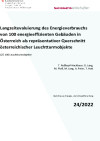
Erfassung, Auswertung und Analyse von Energieverbrauchsdaten von 100 energieeffizienten Gebäuden in Österreich über eine Betriebszeit von 3 bis 25 Jahren als repräsentativer Querschnitt der österreichischen Leuchtturmobjekte. Differenzierung nach Gebäudetypen, Energieträger und Ermittlung der realen Treibhausgas-Emissionen. Vergleich der gemessenen Verbräuche zu Benchmark-Werten.
Schriftenreihe
24/2022
T. Roßkopf-Nachbaur, G. Lang, M. Ploß, M. Lang, A. Peter, T. Hatt
Herausgeber: BMK
Deutsch, 143 Seiten
Downloads zur Publikation
TheSIS - Thermal renovation with internal insulation systems - investigation and development of moisture-proof solutions
Development of innovative solutions for the retrofit of the building envelope with internal insulation with a focus on the hygrothermal optimization of a moisture-adaptive vapor retarder in form of a paint coating. As a result, the moisture hazard related to the implementation of internal insulation systems is reduced and the energetic, comfort-related and economic advantages are made available.
AnergieLeichtGemacht - Development of Scalable Implementation Models for Geothermal Anergy Networks to Decarbonize the Building Sector
The project develops standardized technical, organizational, and financial implementation models for anergy networks to enable sustainable heating solutions in cities and municipalities. By identifying suitable settlement typologies, analyzing existing framework conditions, and engaging stakeholders, scalable solutions are created. The goal is to reduce planning and implementation barriers and facilitate investments in local anergy networks.
FluccoSan - Circular energy flexibility for resilient, climate-neutral refurbishments
FluccoSan aims to develop innovative and cost-effective refurbishment solutions for the building sector that contribute to achieving the Austrian federal government's climate targets. The focus is on energy-efficient, minimally invasive and socially acceptable measures, so-called “dynamic renovations”. By integrating the circular economy and social science research, these solutions should ensure long-term sustainability and a high level of acceptance among users. Status: ongoing
Diverse DH Pöchlarn - Diversification strategies for a sector-coupled district heating supply in the municipality of Pöchlarn
The project aims to explore the feasibility of maximizing industrial waste heat extraction into the district heating system of the municipality of Pöchlarn so that the defossilization path can be taken further.
PersonAI - User-Centered AI-based energy services built on personal preference models
Conduct a large-scale, long-term study with 40-50 people to create personal comfort profiles to increase comfort in buildings. The personal comfort profiles will then be fed back into the building control system as input variables in a proof-of-concept.
HeinrichBiCool - Climate-positive cooling and biodiversity through intensive greening of buildings
Using the example of an existing building of the University of Graz, currently affected by overheating, the project demonstrates what greening can achieve. Comprehensive monitoring of the indoor climate, building physics, energy requirements and biodiversity before and after the greening measures provides new scientific findings on the actual effectiveness of building greening.
